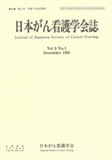Japanese
English
- 販売していません
- Abstract 文献概要
- 参考文献 Reference
- サイト内被引用 Cited by
要約
末期がん患者は病院という環境において入院から死をむかえるまでの経過の中でどのような経験をし,自分自身や周囲の状況をどのように解釈しているのかを明らかにする研究を行った.研究者が看護婦として入院中の末期癌患者と関わり,その関わりの中でとらえた患者の経験をデータとし,KJ法の手法を用いながら経験の意味を分析により導き出した.
KJ法の手法によって統合された8つの関心領域にそって経験の意味が理解された.その関心領域とは,a)苦しい病気に罹ってしまった,b)死にたくない,c)より良く生きたい,d)生きていける,e)自分の状態に関して確信が持てない,f)私を助けてくれる人が必要,g)周りのものが気になる,h)なるようにしかならない,であった.
末期がん患者に全人的看護を提供するためには,患者の生きる力を信じ,患者が死や病状の悪化を経験することを恐れず,あるがままの患者を理解しようと努めることが必要であることが示唆された.
Abstract
The purpose of this study is to understand and explain the meaning of experiences of cancer patients at the late stage. One of the authors gathered data through her experiences through nursing of 4 cancer patients for 5 months. Each patient was hospitalized and at the late stage of the disease. The data were analyzed using qualitative analysis technique : KJ Method.
From an analysis of the data, we withdrew 8 themes that concerned the patients' consciousness : perception of the seriousness of the disease, desire to stay alive, hope for a better life, confidence in survial, uncertainty of the condition, need of support from others, sensitivity to their surroundings, and reconciliation. We found that despite the increasing prostration and suffering of these patients, they continued to show their a strong urge to live. During this time, they needed physical and psychosocial support from others.
These finding suggested that it is necessary to provide comprehensive nursing care cancer patients at the late stage ; nurses should recognize their will to live ; and at the same time they should be able to help them come to terms with their condition or ultimate death.
Copyright © 1995, Japanese Society of Cancer Nursing All rights reserved.


